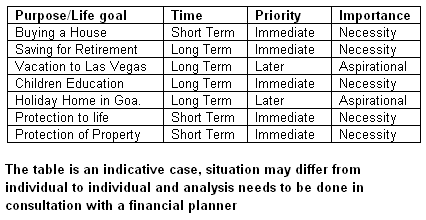
The general perception of financial planning is managing one's money. It is widely considered as just managing cash flow and wealth management. Precisely the questions being asked are:
1. How much should one save?
2. How much should one spend?
3. How much money is required to survive in the future without compromising on lifestyle?
All these questions can be answered with the help of tools like spreadsheets or financial calculators, but what remains unanswered is: Is this activity financial planning? The answer is no.
Financial planning is a far broader process covering a whole gamut of aspects other than creation of wealth. These are: protecting the wealth and value of assets including life; avoiding tax leakage by making all our financial transactions tax-efficient; and passing on the assets created with our hard work to its rightful owners of our choice, and in totality ensuring that our life goals are duly met. All these go concurrently with achieving our life goals in a systematic manner. This is the true essence of wealth creation and progression.
The writer is working with financial planning Standards Board India (FPSB India) in the capacity of Vice Chairman and Chief Executive Officer. The views expressed here are personal, and do not necessarily represent that of the organization. FPSB India is the sole marks licensing authority for the CFP marks in India, through agreement with US-based FPSB Ltd.

Life goals could be any of the following:
1. Buying a Home
2. Saving for children's education
3. Planning for retirement
4. Saving for children's marriage
It involves a holistic approach to assess where one is financially, and what needs to be done to achieve the life goals in consultation with a competent professional like a certified financial planner or CFP professional.
FPSB India prescribes a six step financial planning process. The process involves gathering relevant financial information, setting life goals, examining current financial status and coming up with a strategy or plan for how one can meet the goals given the current situation and future plans along with continuous monitoring and adjustment so that the journey toward achievement of life goals stays on track.
One aspect that clearly distinguishes financial planning from management of money is the focus on all the areas of personal financial needs of an individual which include the need for protection of wealth through insurance planning, optimising the returns on existing assets for future through investment planning, planning for the sunset years and thus covering the risk of outliving one's corpus through retirement planning and management of tax flow utilising the benefits provided by regulations through effective tax planning. Financial planning also takes care of succession through estate planning because it is important that the hard earned wealth is distributed as per one's effective desire.
Thus it can be said that financial planning needs to be seen as a much broader process than just the management of one's finances. The focus of financial planning is on achieving the life goals through proper management of the available financial resources. Here we must see that money must be seen as the medium of achieving these goals, not as an end in itself with no goal defined.

Many people do not have a clear idea about their life goals, as they fail to pay proper attention to these due to a long time left in the goals. Goals like retirement and children education look too far to be cared for in the early stages of life, which if ignored to a later date may pose a challenge later.
Thus the primary objective of financial planning is to identify these goals with the help of a financial planner who can also help to put these goals in the measurable format which will make them clear. Once these goals are clearly spelt out it becomes very important to prioritise them in order of importance, so that one is not compromised on the expense of other. Financial planning involves the analysis of these life goals and put them in an order in terms of the financial commitments that need to be put towards them in terms of amount and timing.
The table alongside analyses some of the financial goals on their priority and necessity scale.
Financial decision-making is a complex situation and the presence of financial planner can help an individual making a rational decision. As an example, buying a luxury car might be high on an individual's agenda even if it would mean compromising on planning for retirement as retirement being away does not look so urgent, but the presence of a financial planner will ensure that the individual does not fall into this trap and the long term financial plan does not get derailed.
Financial planning is a very systematic process and help of professional needs to be sought who will help you through your life in achieving the goals that are there either as a result of a need or as a result of aspiration. It must be clearly appreciated that a financial planner is going to be the guide, coach and friend who will make your journey of achieving the life goals easy and achievable.
Most of the decisions in our lives have financial implications and during such times having a trusted aide and advisory as a certified financial planner professional holds us in good stead, as a CFP professional is equipped to handle all the matters related to finance in the life of a client at the same time keeping an eye on the long term financial goals of the client which are enumerated in a comprehensive financial plan.